Q Life spoke to Reema Abu Hassan, founder of ceramics studio Clay Encounters, to discover how she’s nurtured her creativity and continued to discover inspiration during the restrictions imposed by COVID-19, as well as her plans for the gradual reopening of her studio – her pride and joy.
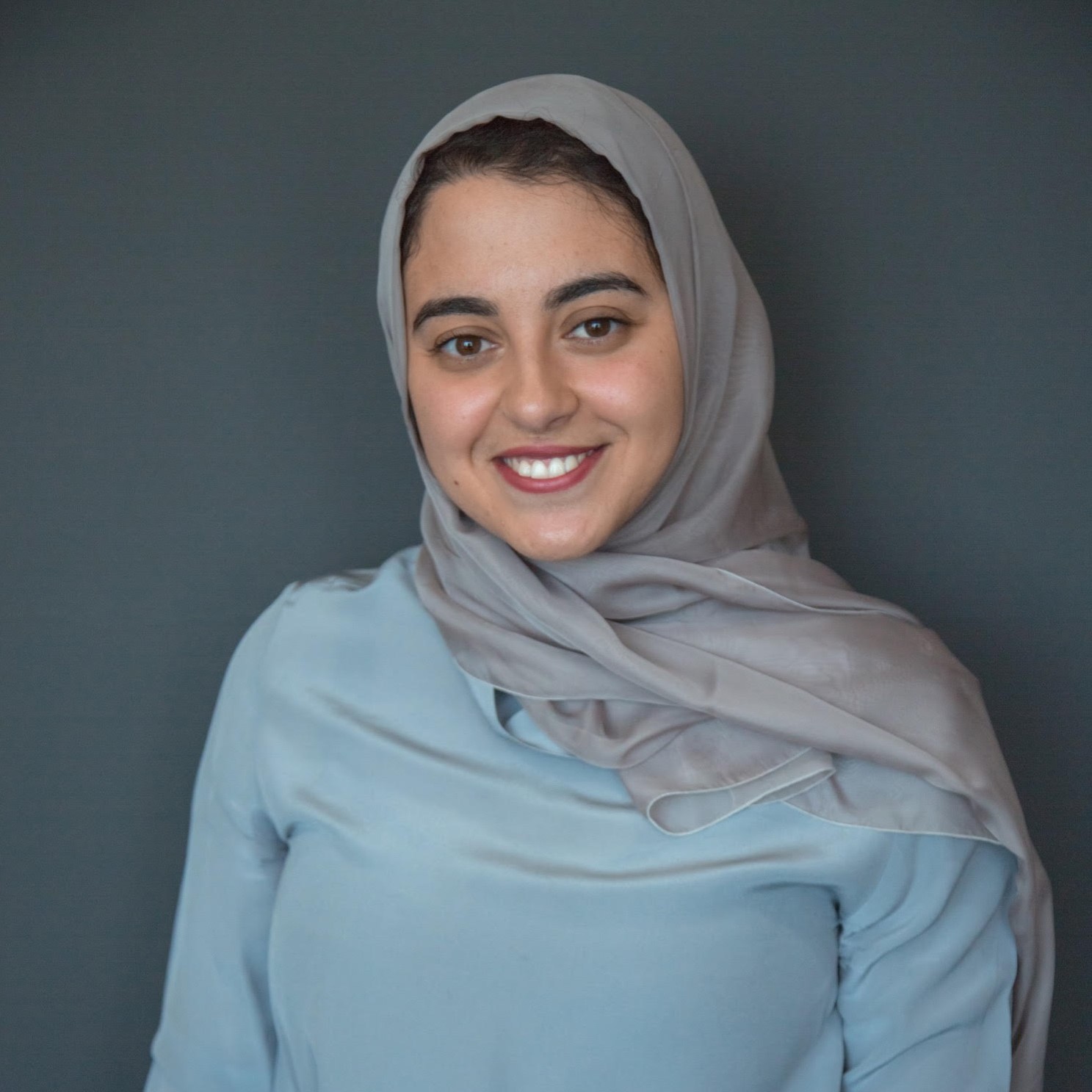
As a creative and entrepreneur, how would you describe your experience during lockdown?
Lockdown has been quite an adjustment and it was very easy to perceive it as a setback, however I quickly realised the opportunities that it presented to me as both a creative and as an entrepreneur.
We made an early decision to cancel all our classes and close the studio because I felt a massive sense of responsibility to keep the community’s safety as our top priority. Despite the setback, I saw it as an opportunity to reflect on my work and on Clay Encounters. With the pace of everyday life slowing down, I was able to readjust what I do through my studio. I began to reconfigure the studio’s different components and shift the focus to design and material exploration, and to develop the craft by incorporating more digital tools.
Overall, I’ve found these past few months in lockdown to be productive, innovative and refreshing. I have created an exciting plan for the development and growth of the studio as well as the design work that we craft and make at Clay Encounters.
Lockdown has been a difficult time for many, how have you continued to find inspiration?
The most difficult part of lockdown was being away from other creatives and the community that I constantly engage with. I knew that I craved these connections that I had developed with people, especially other designers and artists. Once I realised the opportunities that virtual meetings could facilitate, I was able to find tremendous inspiration by engaging in different forms of collaboration. I continued working on projects that I had begun before lockdown, while also developing new collaborative projects with other designers virtually.
I also set up weekly meetings to discuss ideas and work on design projects. I found this kept the inspiration and creativity going throughout lockdown for me, as well as for those I was working with. I cannot wait to share the results of these collaborations once they are ready.
I also found inspiration through redirecting time that I would usually spend teaching towards designing and making ceramic objects for people’s homes. We began to accept more commissions, exploratory projects and larger scale orders. I approached each project as an opportunity to push the object’s craft and the design beyond what we typically do at Clay Encounters. The results and feedback kept me going and fed my drive to design and be as productive and creative as possible.
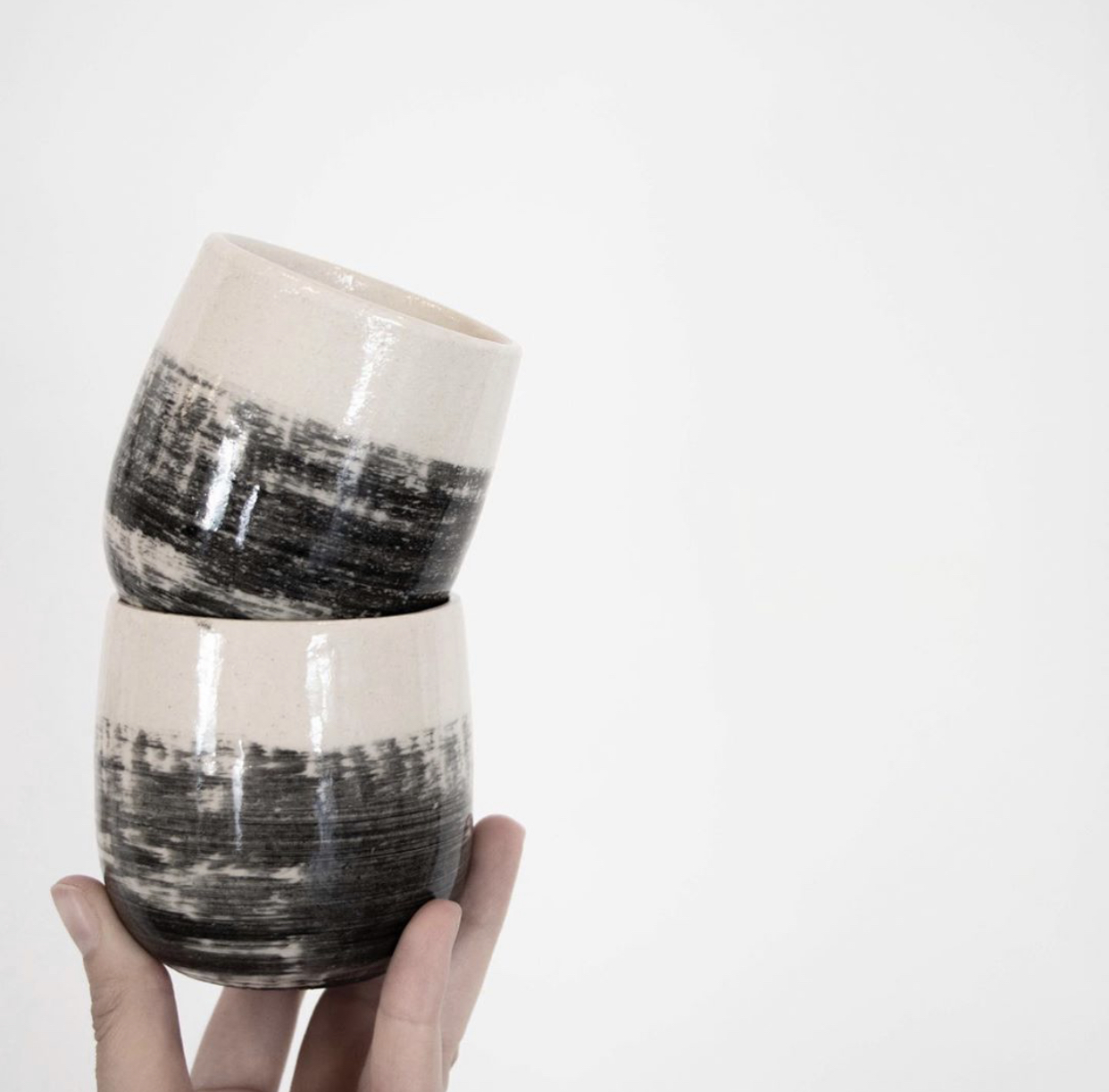
Can you explain how you have adjusted your business and studio to respond to the challenges imposed by the COVID-19 pandemic?
Like many other businesses we had to adjust rather quickly. The majority of day-to-day work involves community engagement and offering workshops and classes. With the in-person classes out of the question, for safety reasons, I began to focus on design and making. The biggest adjustment was setting up a home studio to make ideas, collaborations and designs a reality. I was also able to explore new techniques, projects and ideas. These explorations and projects led to the production of many unique pieces, so I decided to set up an online store. We did not have an online shop before lockdown, so I view the lockdown as a blessing in disguise that allowed me to push myself as a creative and benefit from new opportunities to grow and expand our business.
What kind of advice can you give to other entrepreneurs during this period?
I think the biggest advice that I could give other entrepreneurs is to utilise this time to reflect and consider opportunities to support the work that they had typically done prior to COVID-19. It is very easy as an entrepreneur to get caught up in the work you do. Reflection is key to growth and development, as both a creative and as an entrepreneur. I think that all entrepreneurs should look at this period as an opportunity to expand, alter and most importantly enrich the work that they do. My adjustments have enriched my work and what Clay Encounters has to offer. All of the changes made during the lockdown will feed into the development and growth of the work that we do.
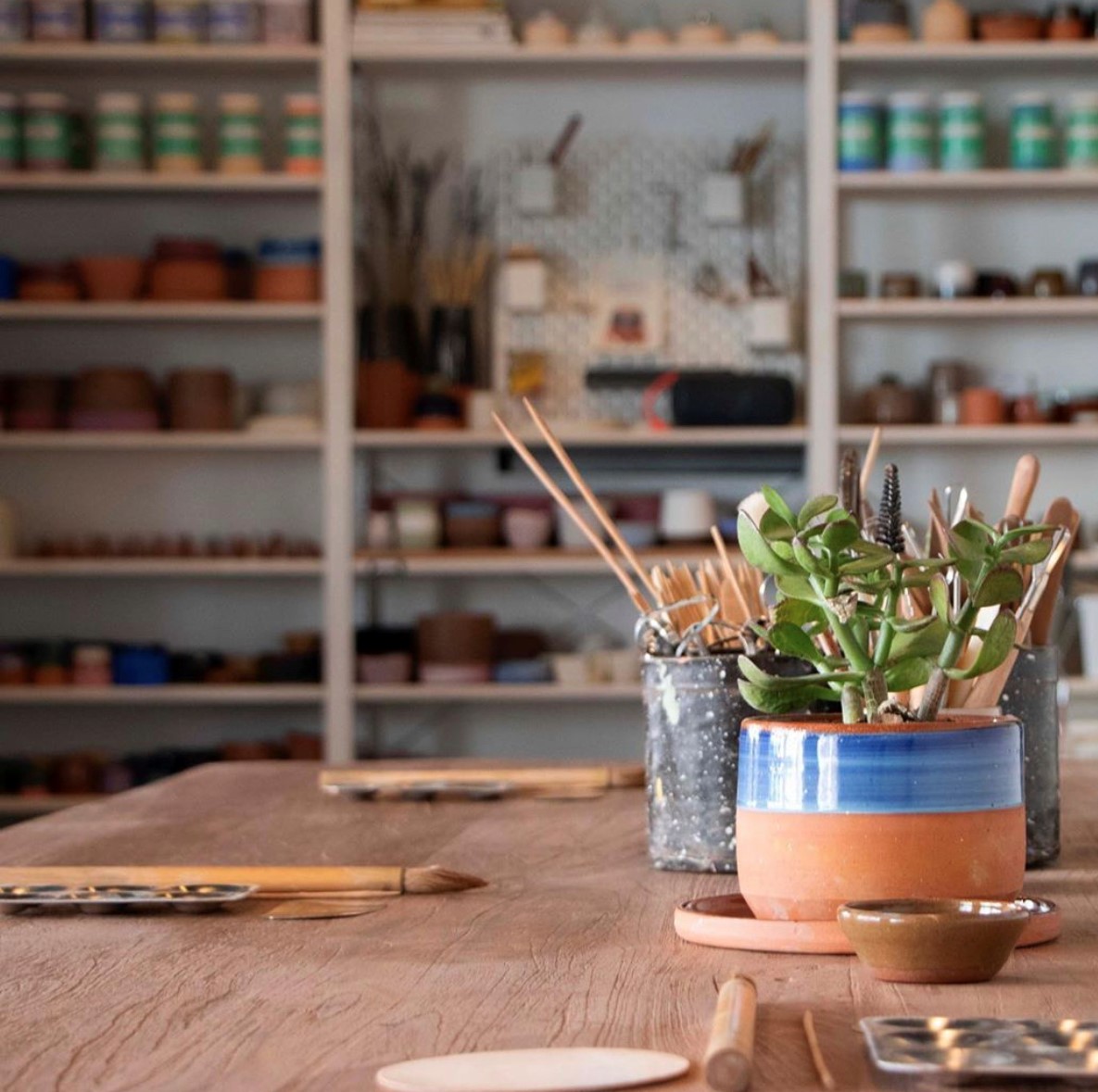
How are you feeling as your business and studio begin to gradually re-open again?
I am very excited to have begun to gradually re-open the studio. I am proud of the community that has been built around the studio and it brings me so much joy to see that slowly coming back. Lots of people got in touch during lockdown to express how much they miss the studio, the craft and the community. For many of our members, they find their time spent at the studio to be stress relieving and reviving. The lockdown has caused anxiety for many and our members have been keen to return and have a hands-on experience with clay once again. Seeing our members’ smiles and our shelves fill up with their work brings us so much joy.
We also have a huge responsibility to make sure that everyone is safe and follows the precautions, so we have set up systems to ensure everyone’s safety. I am really looking forward to restarting classes and bringing back the studio space atmosphere of Clay Encounters as soon as it is safe to do so.
The hawksbill turtle is a historic inhabitant of Qatar’s natural environment. This turtle has called the Arabian Gulf home for thousands of years, but despite its rich history in these waters, it’s currently vulnerable and its species is ‘critically endangered’ globally.
Thankfully, Qatar University (QU) has taken up much of the mantle in protecting some of Qatar’s most vulnerable animals, supporting a rich biodiversity and raising awareness of the plight of endangered species domestically. QU’s Environmental Science Centre (ESC) is leading the way in providing practical solutions and has one of the longest running conversation projects for marine turtles in the region.
These majestic creatures lay their eggs across beaches in Northern Qatar, and from June to August, their hatchlings take their first strokes into the world, crossing sandy beaches to the ocean realm.
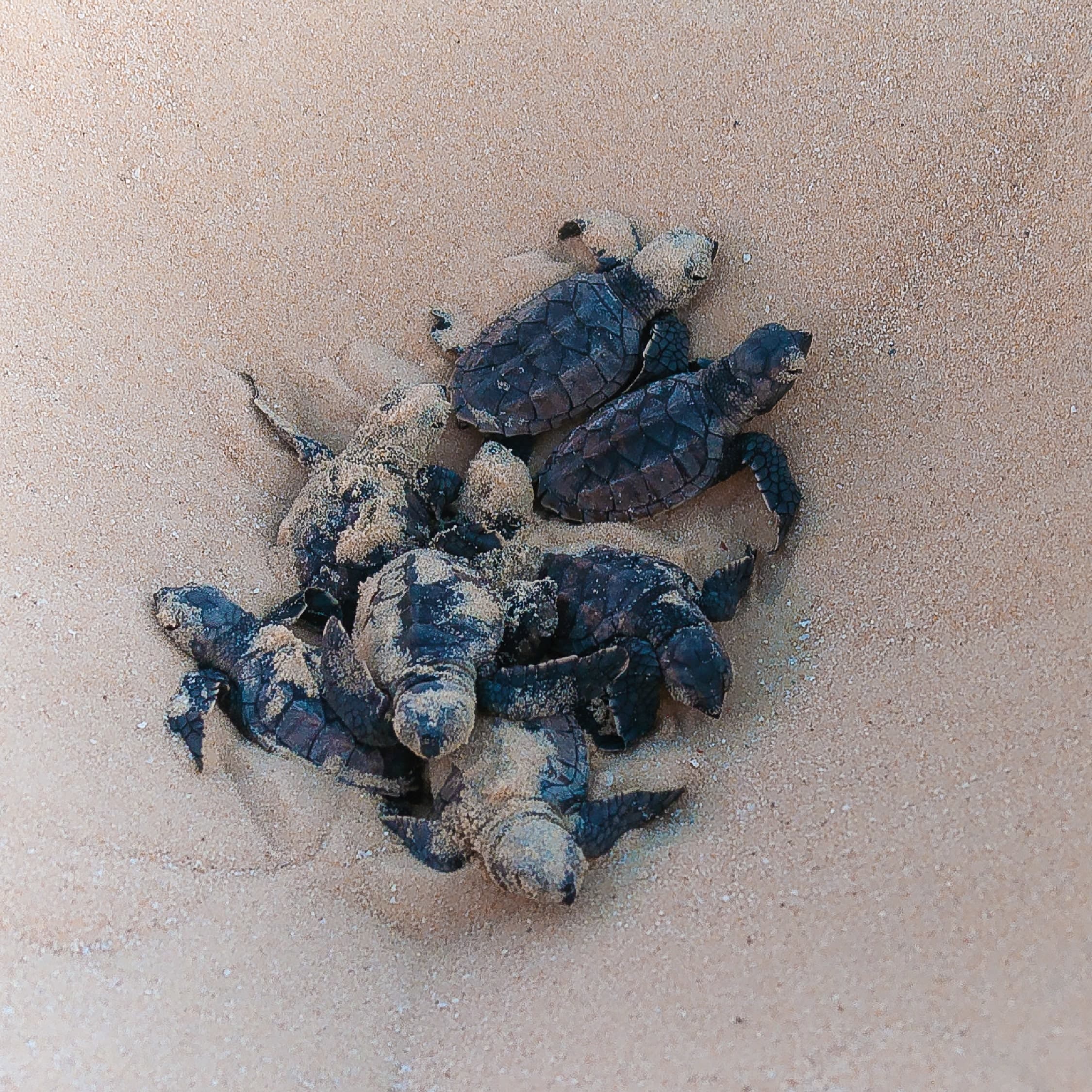
The institution’s research is as interesting to us as it is worrying for turtle populations. These beautiful animals are particularly sensitive to the effects of climate change. According to the ESC’s initial studies, a one-degree Celsius nest temperature increase can lead to eggs only producing females, while a one-degree decrease can lead to only males. With temperatures rising across the globe, the species is at risk of seeing its male population irreversibly depleted. We are used to seeing melting ice caps, bushfires and dramatic flooding, but climate change will affect species and environments in less obvious, but no less dramatic, ways.
Technology has boosted efforts to track these often elusive creatures, enhancing data quality and offering new insights. However, technology can’t prevent the sleepless nights patrolling beaches in remote locations, which are key to obtaining a full picture of turtle activities and ensuring these animals are breeding successfully. All in all, it’s exhausting but richly rewarding work.

Despite the current COVID-19 pandemic, the project has continued to run normally, with the animals able to avoid any movement restrictions. As public access to beach sites have been restricted, the team has also seen interesting behavioural changes from the animals, with a greater variety of beaches visited by turtles and previously quiet beaches seeing great nesting activity.
To the team at ESC, the reason is clear: “Previously, we witnessed turtles turn back and fail to dig nests due to rubbish on beaches or compacted sand from vehicles”. As the ESC continues to work day and night to protect these much-loved reptiles, our role in supporting their efforts is more obvious and more important than ever.
Hamad Sabt Sabti’s passion for the sea courses through his veins and flows from a seafaring past. His father’s background as a sea captain “built a strong connection between [himself] and the ocean”, and Sabti “turned this passion into a profession and became a diving instructor” in 2007, taking him on an unforgettable journey.
Scuba diving has given him the opportunity to explore Qatar’s environment, and he’s immensely grateful to the hidden locations of the Arabian desert, with a rich variety of species and beautiful diving destinations. Moreover, Sabti describes how diving is so much more to him than a hobby: “Diving is a natural stress reliever and a great way to meditate. When diving you can learn to control your heartbeat, to breathe and let go. Far from the daily routine, I admire this distinctive and calm world.”
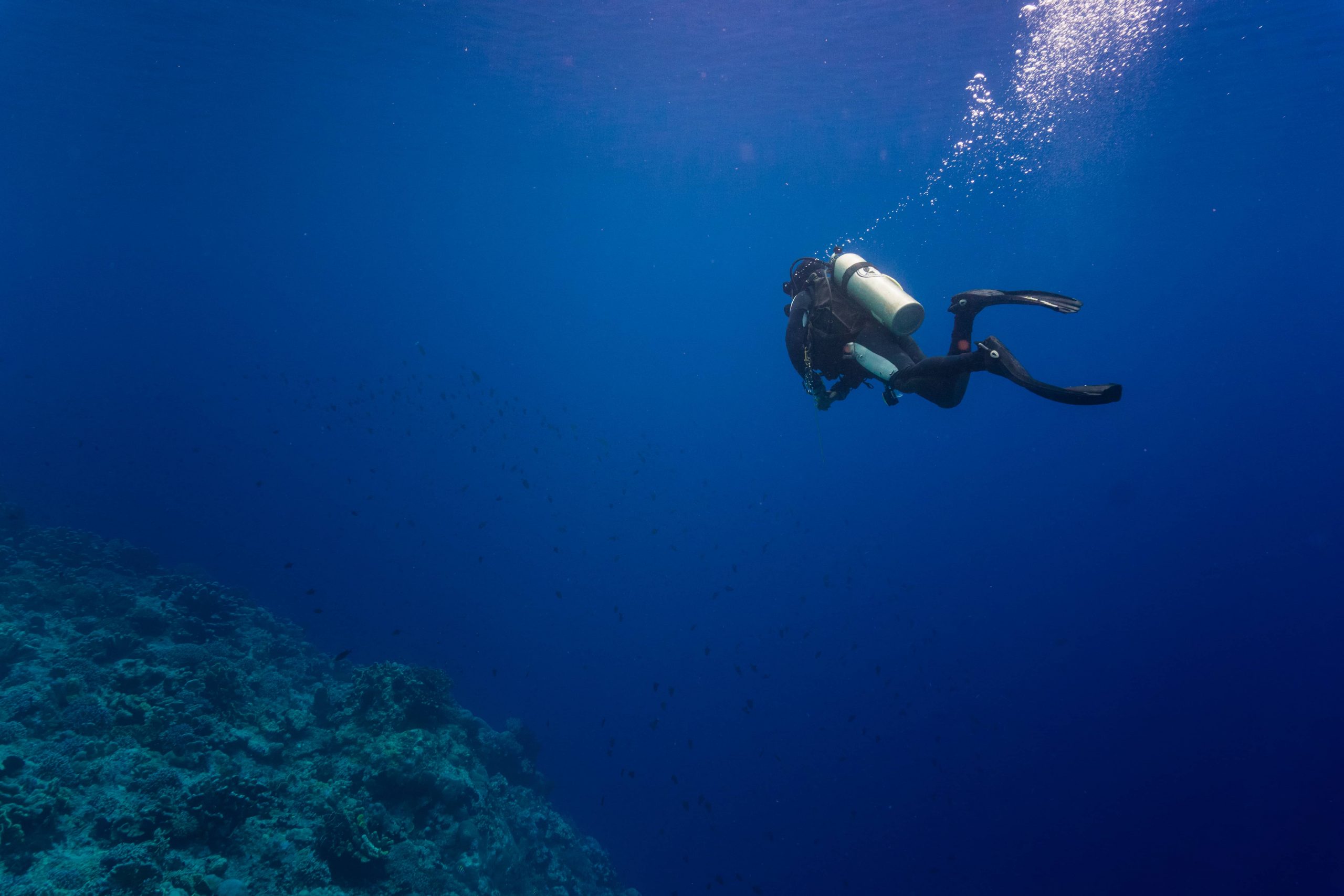
Sabti’s experiences speak to the benefits of being outdoors and among nature, and whether underwater, climbing hills, or taking in fresh air on a brisk morning walk, the rewards of exploring Qatar’s natural environment are countless.
Sabti’s highlight so far? An unforgettable dolphin encounter: “No matter how many times I witness dolphins swimming around our boat, it will always be breath-taking and unique.” Sabti reiterates that there’s a lot to see in Qatar if you know where to look, and his stories underline Qatar’s varied biodiversity.
When we asked Sabti about the opportunity for the environment to recover afforded by restrictions following the COVID-19 pandemic, his deep admiration for nature was evident in more ways than one: “As much as it saddens me to be away from what I love, it also brings some joy to know that the sea creatures are enjoying this time alone, as it has offered some relief to the natural world.”
The path that lies ahead is at a crucial juncture for our environment, while restrictions regarding COVID-19 have heightened our appreciation for nature. For Sabti, his hope is that “this pandemic will be an eye opener to all those who dive or spend time at the beach, it is an opportunity for us to change our habits and to protect our marine life for generations to come.”
We couldn’t have put it better ourselves.
Ibrahem Al Harami is not your typical runner. As restrictions have reduced people’s ability to move outside, Al Harami is lucky to have a space used by very few others. Considered inhospitable by those yet to visit, he runs, rides and boats around the Qatari desert and coastline, educating people on its wonders.
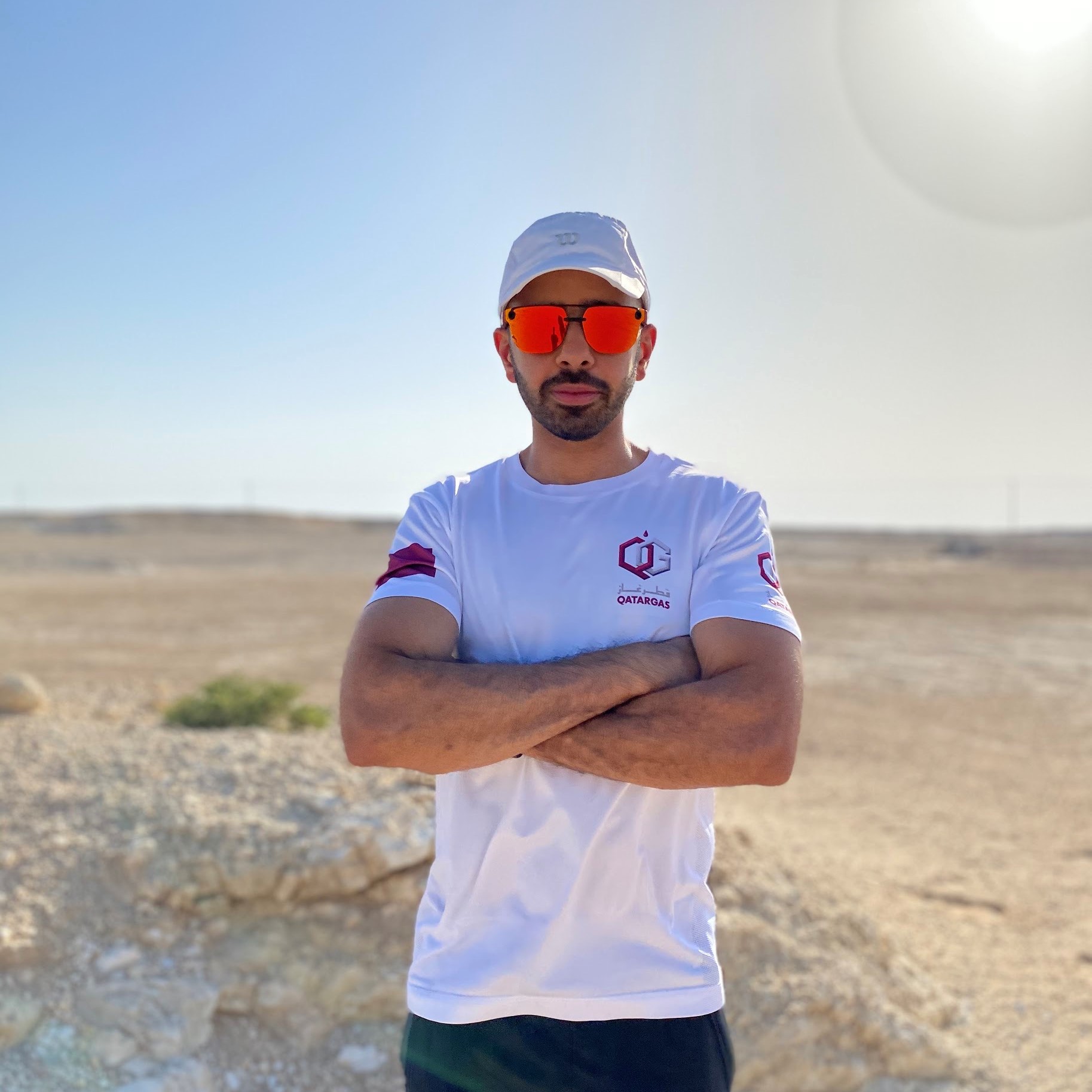
Where did his love for the desert and Qatari landscape begin? “It was in 2004, when I joined the Ministry of Municipality and Environment. I got so into our environment that I began to feel a deep love for it. This love has only grown since joining Qatargas, who are similarly concerned about supporting our environment.” For Al Harami, every run is a voyage of discovery and our surroundings are crucial to our wellbeing: “I began to understand the importance of the environment for our lives and happiness, there’s so much to explore in nature.”
His relationship with the outdoors has only increased since the outbreak of the global pandemic. “I go out every day. My daily exercise is among nature where I feel both clean and calm, escaping from any pollution in the city.”
While he notes that he’s also been exercising at home, it’s clear that the two do not compare. “There’s no comparison between exercising indoors and exercising outdoors. Nature contains fresh air, sunlight and greenery, a place to enjoy your morning oxygen.” He adds that exercising outdoors helps the body to react to changes in the weather and climate, important as the temperatures outside continue to climb.
Whether its running or walking on sand, grass or rock, Al Harami is convinced that being outside increases one’s empathy with the environment, allowing you to “become part of it.” This is not a feeling unique to Al Harami or Qatar, and many have trumpeted the mental and physical benefits of being outdoors in improving mood, mindfulness and optimism.

We then asked Al Harami if there was anything that would surprise people about Qatar’s natural environment, and his answer was clear; the sheer diversity. “You’ll see wild animals from birds and rabbits to reptiles, historical areas that whisk you away from the modern life we take for granted, and beautiful areas of greenery with a wide array of flora.”
We can’t wait to get out there.
When the coronavirus pandemic swept the world, many shows, ceremonies and celebrations were understandably forced to cancel, leaving people wondering what would fill the creative void. Fashion Trust Arabia (FTA) 2020, an awards ceremony celebrating designers from across the Arab world, was among these. In the toughest of times, it was a up to the organisers to design a creative solution.
They quickly realised that to bring people together, FTA would need to go digital. The show must go on, creativity needs to be celebrated, and supporting design talent is more important than ever in an uncertain world.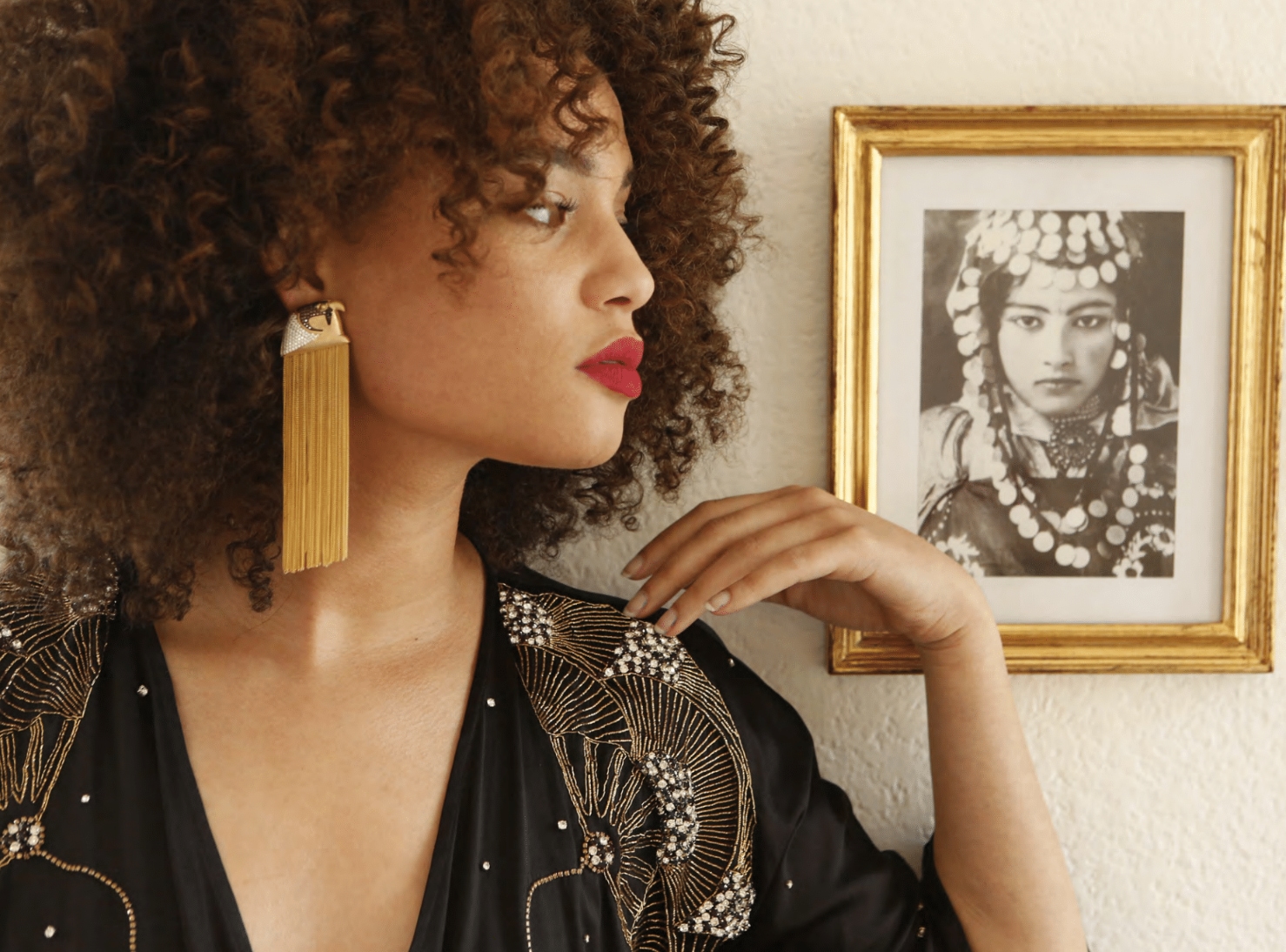
Taking to Zoom, the judging panels discussed and debated the many talented designers competing in five categories. The deliberations were moderated by Her Excellency Sheikha Al Mayassa, determined in her desire to make sure the event would become an even greater success in its new format. From Jewellery Design to Evening Wear, winners were selected from the comfort and safety of some of the most fashionable living rooms around the world.
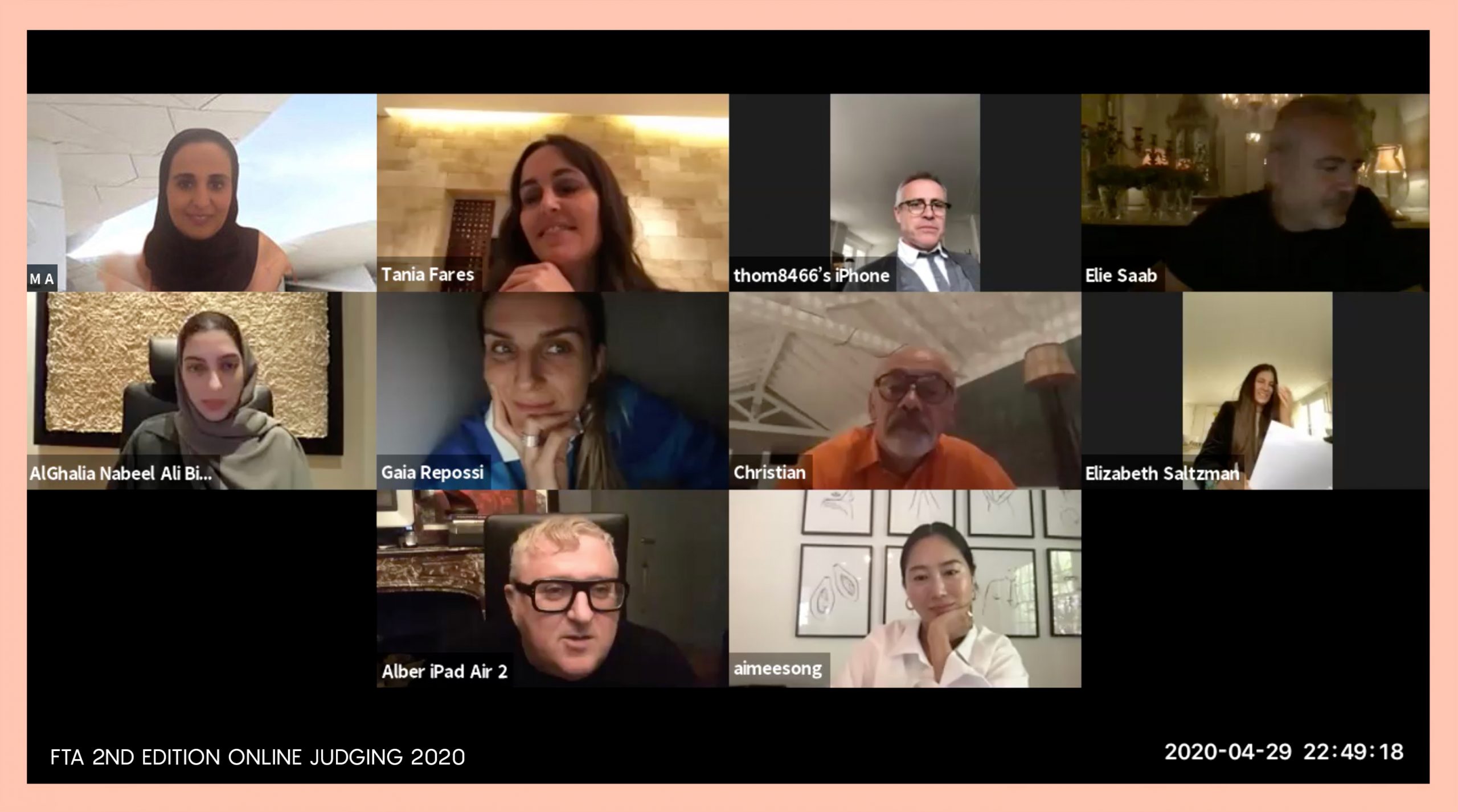
Thanks to the dedication of our judges, the category winners were announced on May 11 in an emotional Zoom ceremony. Every designer in every category had amazed the judges with their talent and the competition was tough, with the winners’ delight clear for all to see. A welcome tonic in trying times, the FTA community came together in celebration and the winners were a perfect representation of the incredible talent the MENA region boasts.
No matter the challenges, Arab design has a bright future.
Jewellery Design: AMMANII
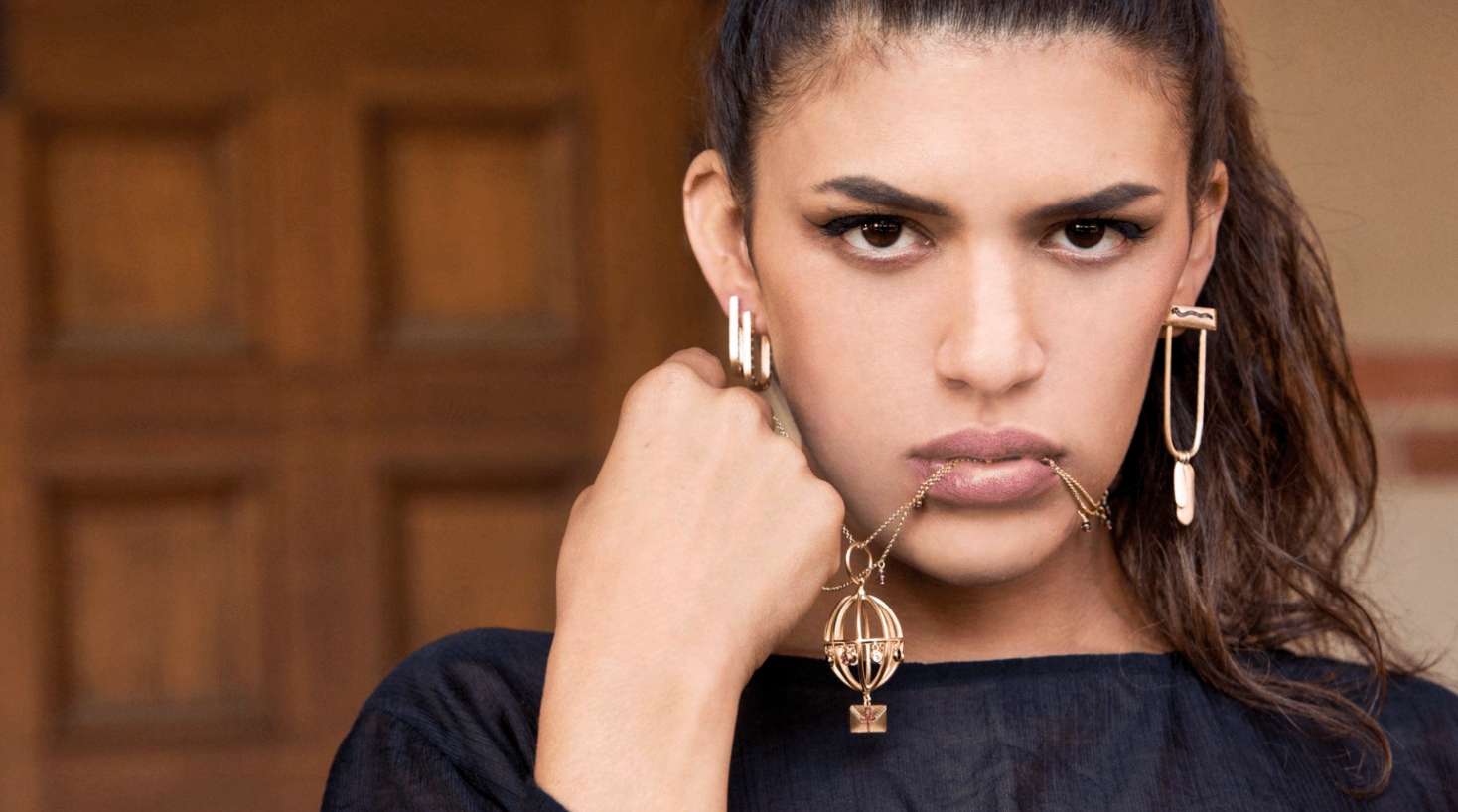
AMMANII was born from the desire to tell stories through a beautiful platform that would provoke a desire for seeking peace with oneself and others despite all differences. There is a shared journey of hope and revived dreams translated through every design. The jewellery is meant to inspire a courageous vision of a global sisterhood. Our stories overlap, and the common thread we share is a desire to find fulfilment, purpose and courage to live it all against all odds and circumstance.
Accessories: Andrea Wazen

Wazen’s time spent in both major fashion capitals helped forge her inspiration and urge to finally create her own footwear brand. Andrea Wazen shoes today are spotted on top celebrities like Kylie Jenner, Scarlett Johansson, Normani, Hailey Bieber to name a few. The brand presents high quality handmade shoes for women, designed and produced in the designer’s beloved hometown, Beirut.
Evening wear: Yousef Akbar
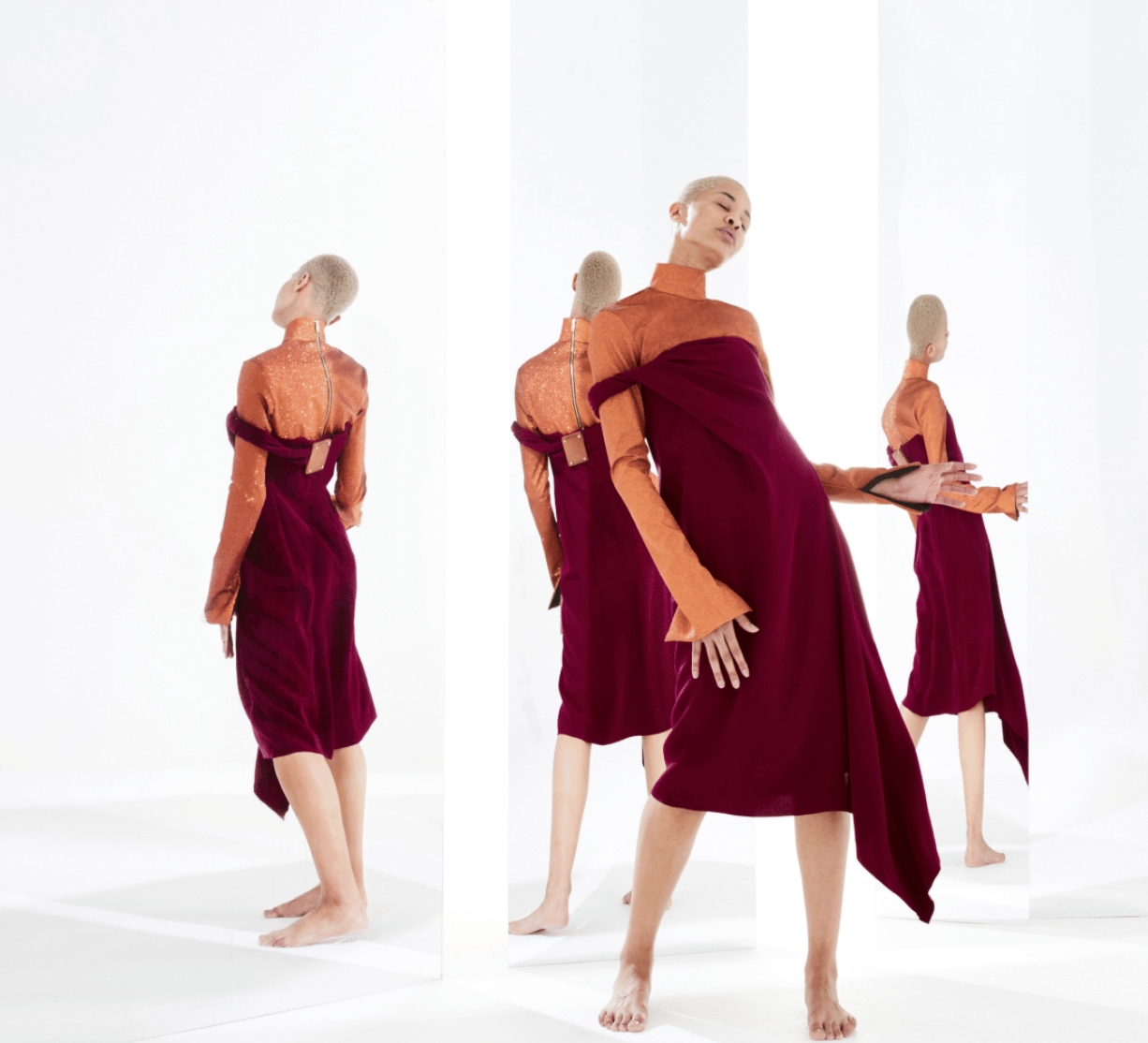
When you wear one of Akbar’s garments, you not only will be living his story, but you will be experiencing his personal research and quest for inspiration. The brand is built on creating ethical and responsible couture and ready-to-wear garments that not only make the wearer look good, but also feel good through the use of recycled materials and by supporting local artisans in small communities in the Middle East and around the world.
Ready-to-wear: Omer Asim
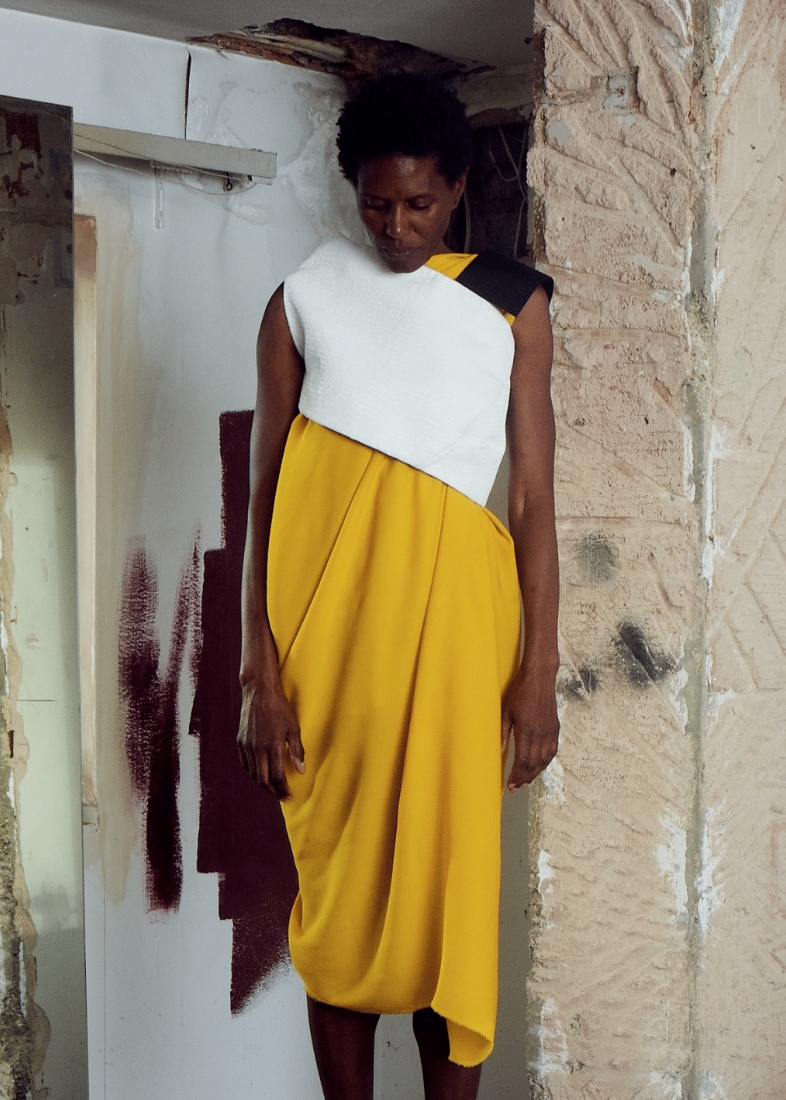
Asim learnt the craft working with Maurice Sedwell of Savile Row and Vivienne Westwood. Before freelancing in the industry, Omer attended Central Saint Martins specialising in ‘creative pattern cutting’. His design process does not rely on sketching or theme inspiration. The focus is on substance and craft to un-design a solid silent aesthetic. Modern shapes, cuts and textures mix with primitive elements to create a sense of regressive future.
Debut talent: Zeid Hijazi
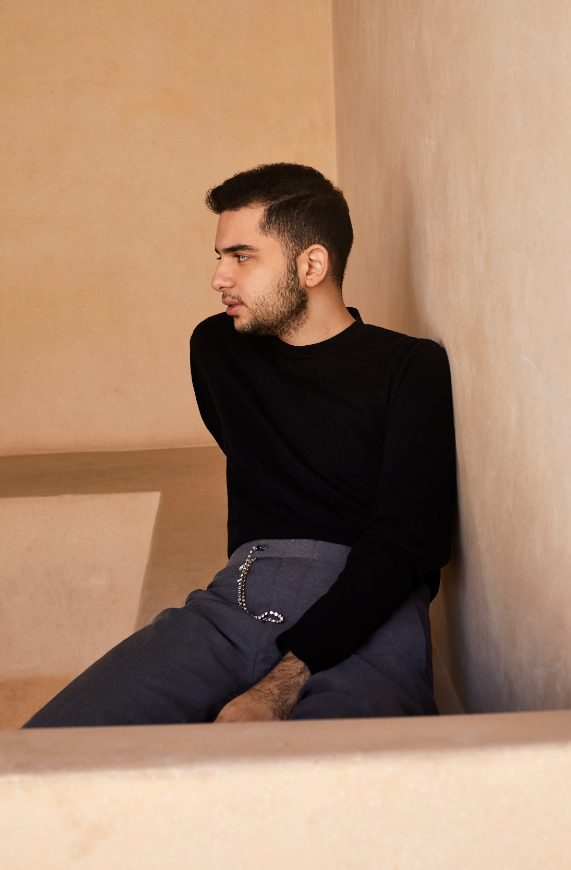
Zeid Hijazi is a Palestinian fashion designer living in between London and Amman. He pursued his fashion studies at London’s Central Saint Martins. Motivated by his idea of a fully open-minded Middle Eastern culture and the creative underground scene in the MENA region, he wants to embrace that creative Arab movement, which is underappreciated globally, through the medium of art and fashion.
Supported by volunteers and donors, the recently-launched Khair Kitchens prepares thousands of meals for Qatar’s most vulnerable workers every day.
There is no worker in Qatar, or anywhere around the world, who has not been impacted by the global Coronavirus pandemic. It is in response to this reality that Qatar Charity launched Khair Kitchens, bringing together donors, volunteers, charities and the private sector to support Qatar’s workforce during this difficult time.
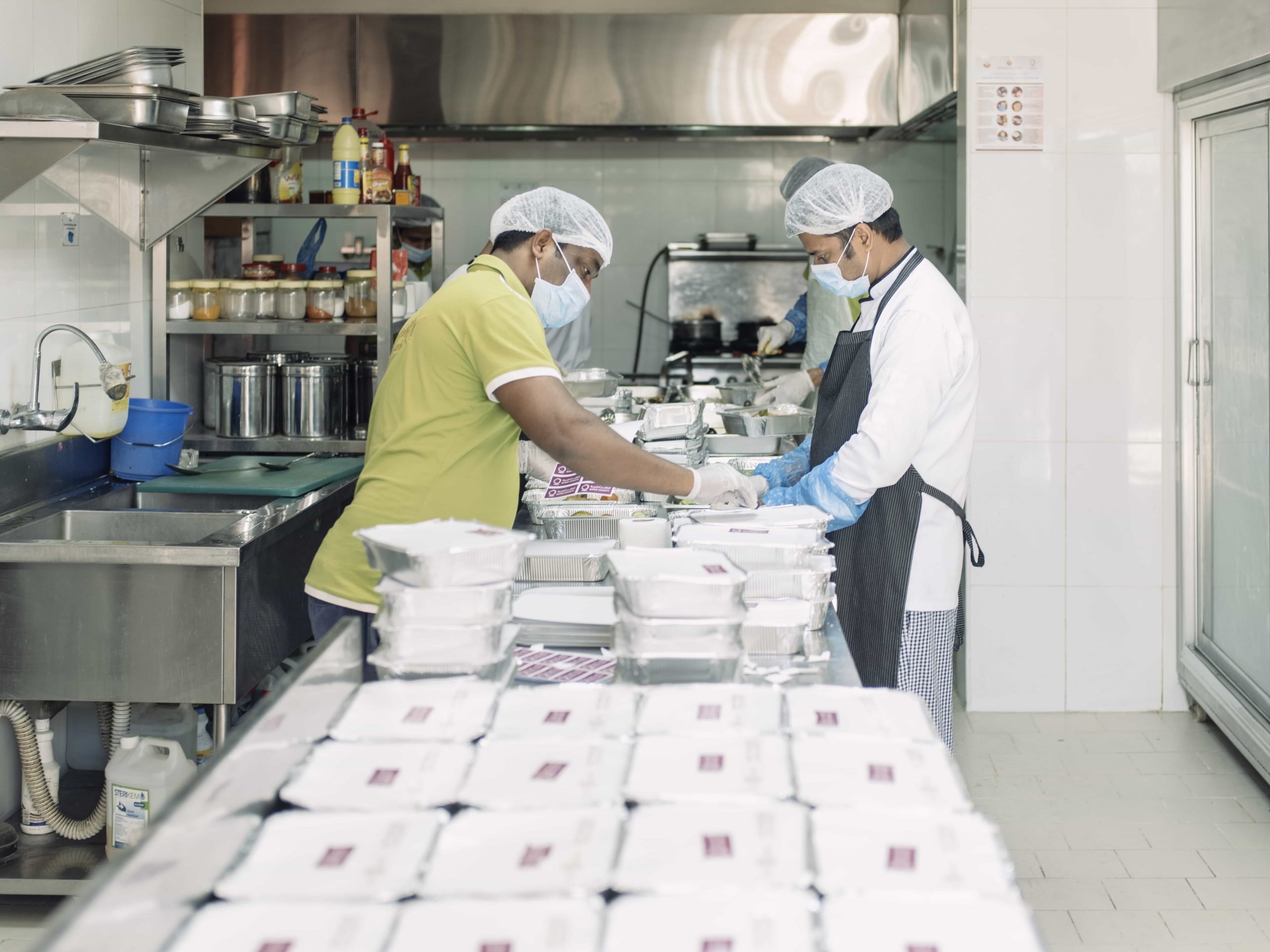
7,000 meals are prepared every day for vulnerable workers, particularly those who live in areas most impacted by the virus. This huge operation requires four volunteer-staffed kitchens, otherwise known as Khair Kitchens. This number is expected to increase in the future, with more than 100,000 meals having already been cooked since the beginning of the pandemic.
The menu includes five different meals, catering for a range of dietary requirements reflected in Qatar’s diverse society. These meals are prepared and distributed to workers with a constant emphasis on hygiene, carried out in coordination with the Ministry of Public Health and Qatar Red Crescent to ensure the safety of both the volunteers and the recipients.
Volunteers are at the heart of this initiative, closely involved in the preparation, distribution, and awareness-building work that goes into Khair Kitchens. Moreover, poultry producers, farms and supermarkets in the local area have offered donations to support the scheme.
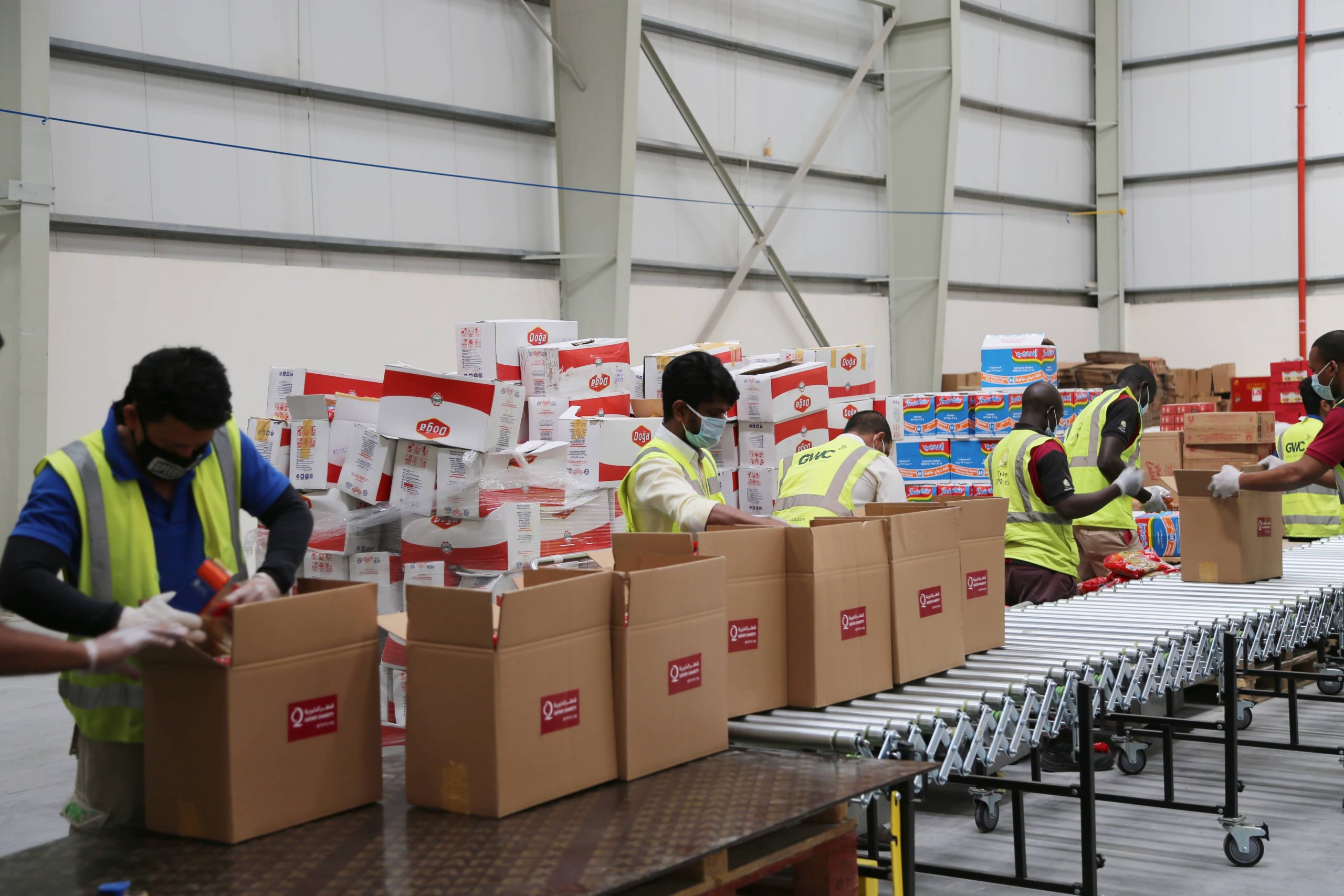
Traditional means of connection and communication have adapted, with new initiatives being launched to maintain and strengthen Qatar’s local communities. Khair Kitchens is the perfect example of this, and showcases the cohesion and solidarity between people within Qatar, illustrating the generosity for which Qatari society is known.
While the current situation can at times seem difficult, we should remember that while we may be physically distant, the spirit of Ramadan, of altruism, and of community, will bring us closer.
Mobilising thousands, Qatar Red Crescent Society exhibits the best of Qatar in the toughest of times.
Qatar Red Crescent Society (QRCS) exists in the background of daily life. From volunteering efforts to booths in malls and supermarkets, QRCS champions the causes of those most in need. Following the outbreak of Coronavirus, these efforts have increased dramatically and the organisation transformed its support system to protect both the vulnerable and wider society. 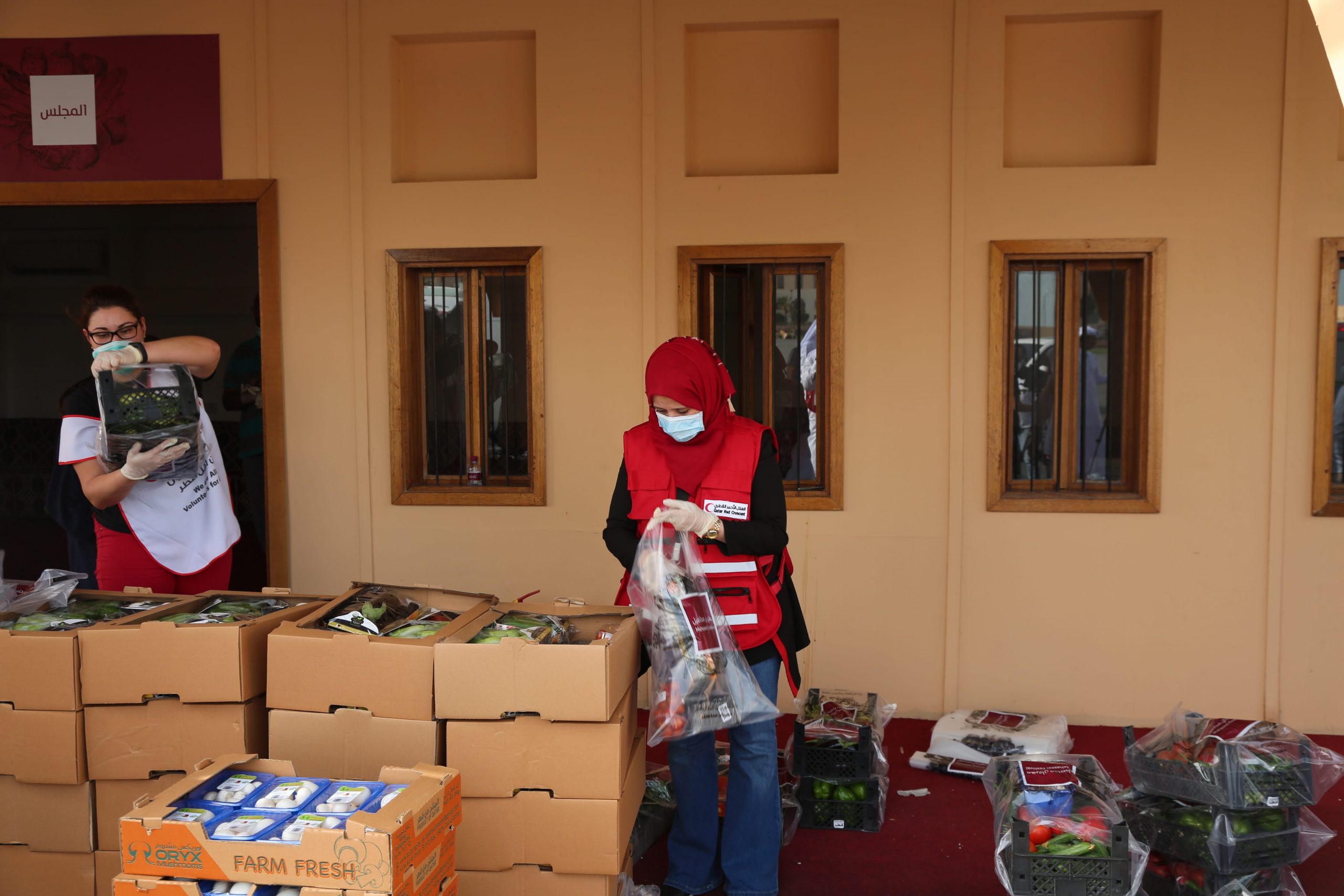
Whether sanitising the country’s streets, developing and distributing educational information to boost awareness of the virus or leading massive volunteering campaigns, QRCS has been at the forefront of Qatar’s fight against Coronavirus.
Such is the charity’s effectiveness, it has been incorporated into the response of Qatar’s Supreme Committee for Crisis Management to Coronavirus. The Committee saw the existing framework that QRCS had in place and sought to unify their activities, which has included the establishment of a medical response committee and a plethora of other successful projects.
As a part of their broader Coronavirus initiatives, QRCS has collaborated with the Ministry of Public Health to provide informative content about the virus in a multitude of languages. From English and Arabic to Urdu and Malay, vital information has been made accessible to everyone and every community.
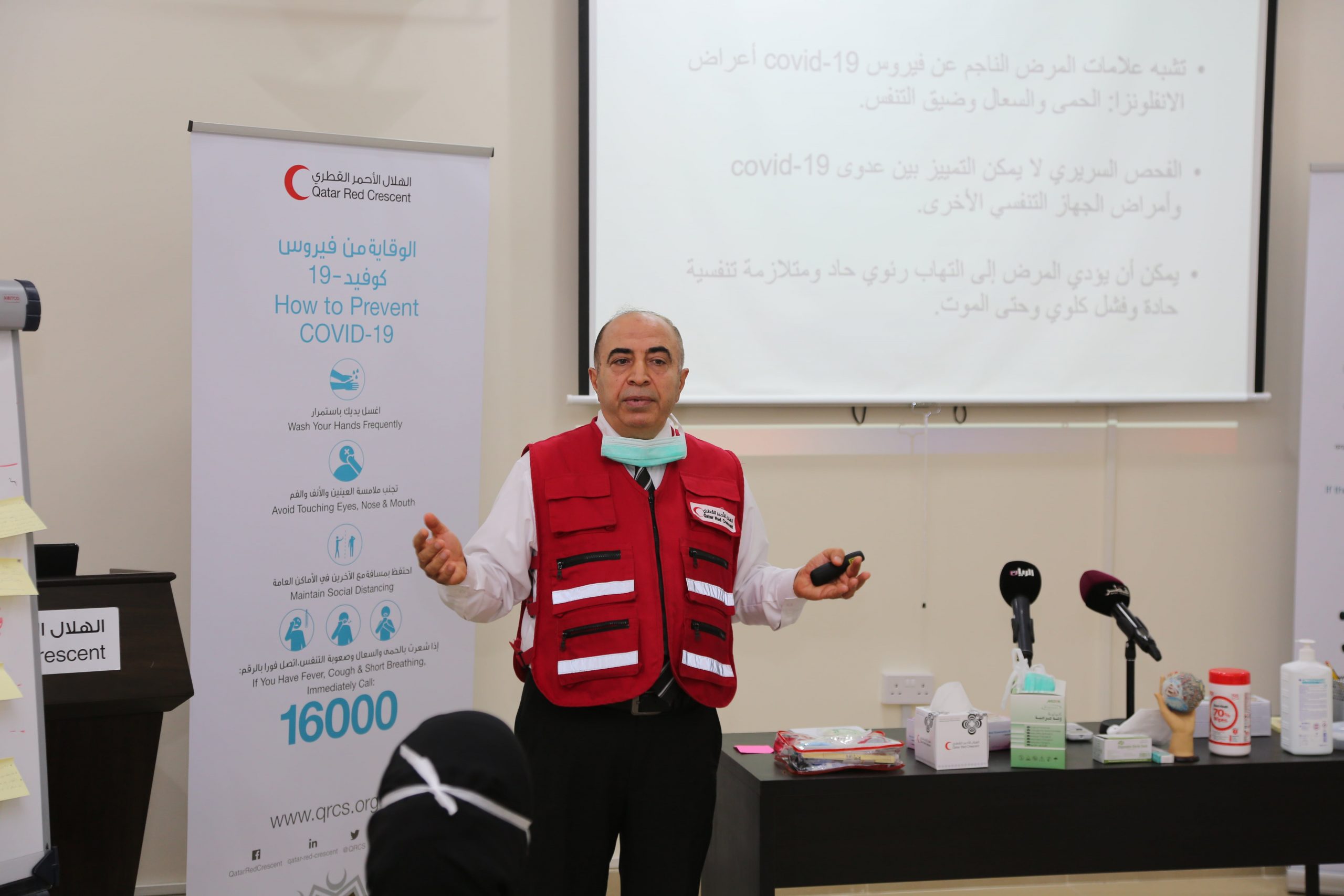
QRCS understood from the outset that the crisis was both a pandemic and infodemic, with misleading information proliferating globally. The organisation quickly identified and targeted specific areas of the country vulnerable to both the virus and a lack of accurate information, providing educational materials in the form of leaflets and lectures and helping to inform every element of society.
These efforts would be futile without the volunteers that form the charity’s backbone. Following the launch of the “Volunteer for Us Qatar” campaign, over 15,000 residents signed up to join the effort. These volunteers exhibited a huge breadth of crucial skills, from providing psychological support and health education, to logistical services and street sterilisation operations. The nation is in debt to these heroes.

QRCS demonstrates that with immense determination, a strong sense of community, and an undeterred commitment to inclusion, local society can mobilise to train thousands, educate hundreds of thousands, and protect millions.
Qatar is keeping its people safe, and QRCS is playing a key role.
Discover Qatar Fund for Development’s (QFFD) huge mobilisation efforts against one of the globe’s greatest challenges in recent history, as well the leading figures coordinating these initiatives.
In response to the global Coronavirus pandemic sweeping the world, QFFD has worked tirelessly to provide important humanitarian aid deployments and a rapid response on behalf of the State of Qatar, supporting the international community in an hour of need.

Collaborating with Qatar Airways, the Emiri Air Force, and the Ministry of Public Health, QFFD carried out an urgent, coordinated relief effort to ensure medical shipments were sent to nations in need. Whether this was aid deployments to Italy, Lebanon, Iran, or urgent financial assistance to the State of Palestine, support was sent to help nations contain the outbreak and mitigate its impact.
Beyond immediate relief efforts, QFFD will also be sending shipments of aid to many other countries across the world, including Nepal and Tunisia, boosting crucial medical support during a critical moment for much of the globe’s populations.

QFFD understands that there is no easy solution when responding to the Coronavirus pandemic. The organisation has factored the effects into many of its development projects. Working with international partners including the American, Canadian, Norwegian and German governments, the Fund will contribute $4.2 million to support the Jordan Refugee Health Fund, supporting the Jordanian Ministry of Health in their efforts to protect both Jordanians and Syrian refugees.
QUEST, another of the Fund’s initiative in partnership with Qatar Charity, supports and protects the wellbeing of pregnant female refugees in Lebanon and has mobilised to ensure the safety of these women and their children during the outbreak.
One of QFFD’s flagship programmes is responding to the crisis through innovation. A joint Qatari-German project, UNDP Accelerator Labs were initially set up to test and scale-up new solutions to global challenges such as climate change and growing inequality, unearthing new approaches that fit the complexity of current development challenges.
As the globe grapples with the spread of Coronavirus, ideas and responses are sprouting up within the Accelerator Lab Network.
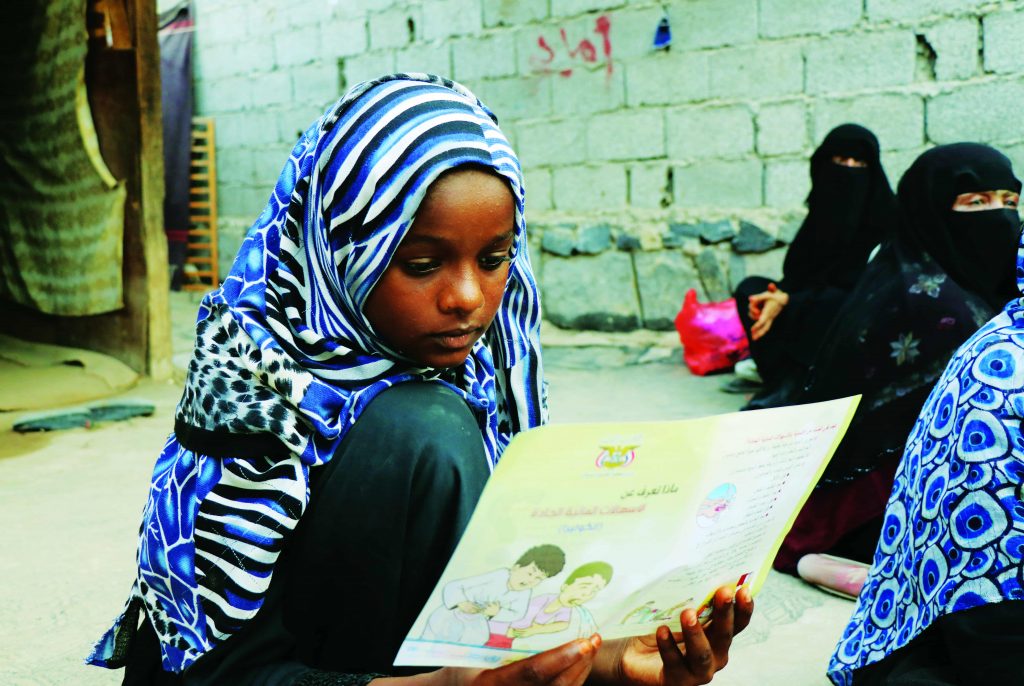
On 17 March, the network participated in a remote collaboration session to address how organisations and governments are coping with the pandemic and to discuss innovative responses, including:
The people ensuring QFFD reaches those in need
Sultan Al Aseeri
Sultan, one of the youngest team members, has been with the Fund since its inception. He works tirelessly on both development and humanitarian aid and supervises international projects that span the entirety of the globe. Following the onset of the Coronavirus pandemic, he has been organising aid shipment supplies with recipient countries, in close coordination with Qatar Airways and the Emiri Air Force.
Yusuf Al Mulla
Since joining the team recently, Yusuf has been working on numerous international aid projects, including support for floods victims in Somalia and earthquake victims in Albania. Coordinating with multiple humanitarian agencies that implement QFFD projects worldwide, his role during the Coronavirus crisis has consisted of ensuring that the process of sending and receiving medical aid supplies runs smoothly and on time.
Maryam Al Subaiey
Maryam recently joined QFFD as Head of Media and Communications, driven by a passion for social change and following the experience of setting up several rewarding local youth initiatives. During the Coronavirus pandemic, she has been in constant communication with internal and external parties, while also highlighting Qatar’s crucial role in the international fight against the virus.
Kummam Al Maadeed fell in love with fantasy writing from an early age and has harnessed this passion to create stories that address mental health issues and inspire young people to thrive.
Al Maadeed published her first book, The Lost Rose, in 2016. It tells the story of “a lost girl who suffers from guilt and depression and how she tries to find the light in life.” While the setting is magical, the issues faced by the protagonist are ones to which many young adults can relate.
“I enjoy writing fantasy books that convey basic mental health issues and can inspire young adults, helping them to deal with daily challenges,” Al Maadeed says, noting that “reading can help ease the anxiety of the current situation.” She sees this as her key purpose, reflecting on her sense of pride “when I hear that my book helped someone battle depression or inspired them to write their own story.”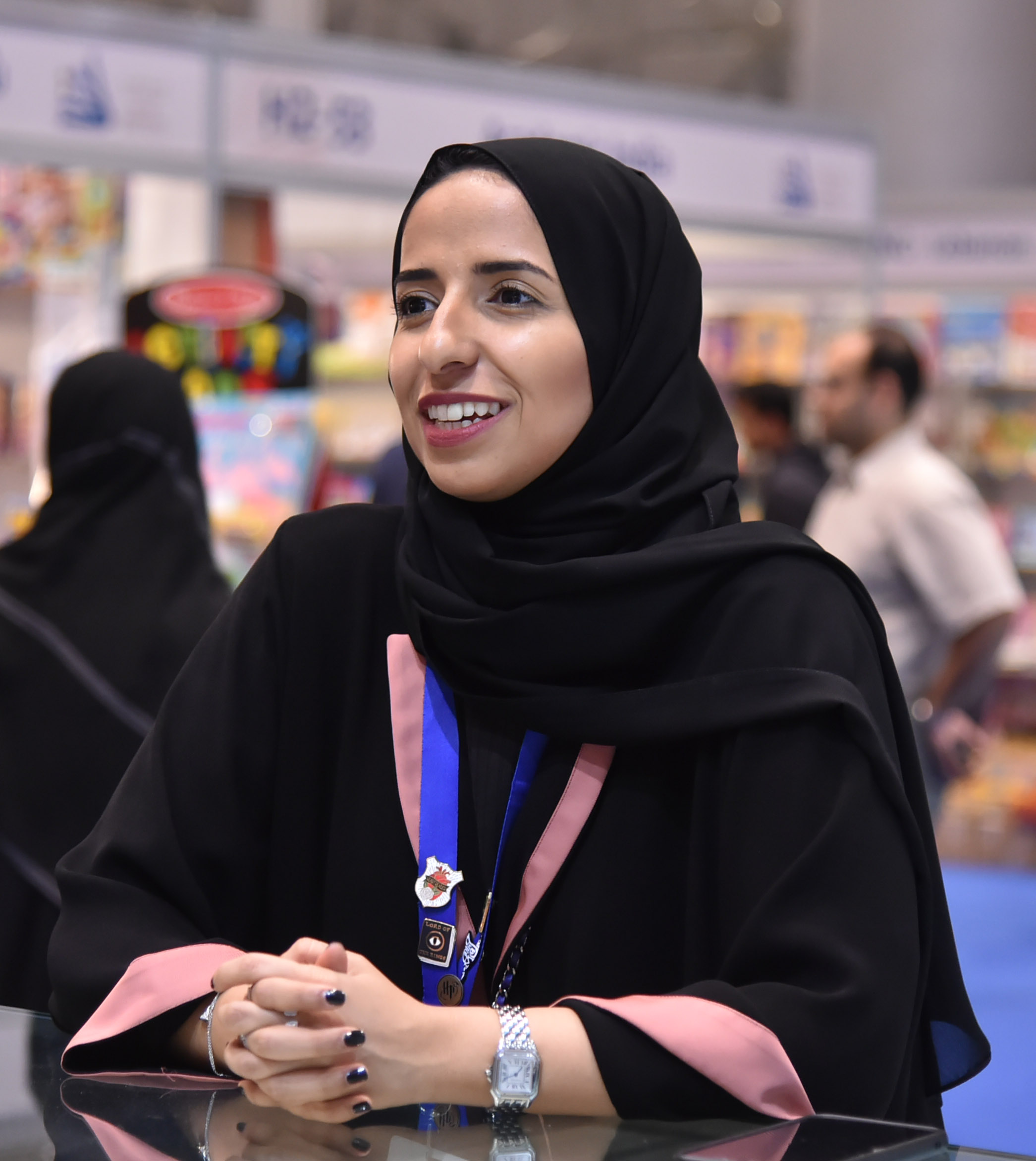
Al Maadeed’s passion for fiction ignited aged 16, when she became immersed in Harry Potter and the Order of the Phoenix. Like many others her age, she fell in love with the magic of Hogwarts, and resolved to create her own worlds. At first, these stories were intended for her own amusement, until she described a particularly adventurous dream to her sister. Her sister’s response changed everything. “Why don’t you write it? Why don’t you become a writer of the books you’ve always loved to read?”
Her advice to other aspiring authors out there is “to keep on writing and never give in to the doubt. Treat writing as a craft and read books and blogs about writing. Reading is crucial as well. The more you read, the better you write.”
Given current circumstances, there has never been a greater opportunity to develop your literary craft. For those looking to write for the first time, it is important to “set aside a few hours on a daily basis to write” and “start with writing exercises like free writing for five minutes or brainstorm an idea.” Some days might result in pages of inspiration and imagination, and other days only a sentence, but “don’t put too much pressure on it.”
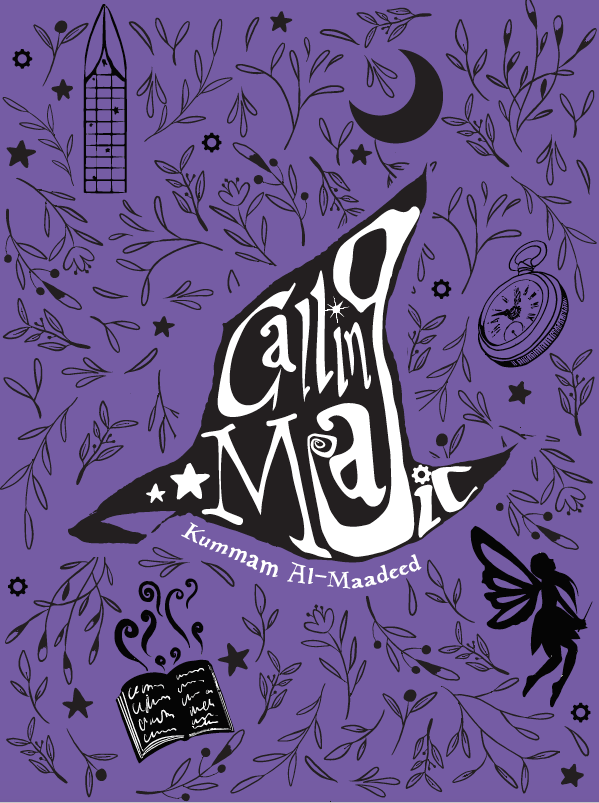
Al Maadeed’s adventures in the real world include working on a comic book in collaboration with the local illustrator Maha Al Ali, as well as exploring the universe she created in her 2019 novel Calling Magic with the sequel Wielding Magic.
Calling Magic was a story focused on “accepting one’s inner strength and believing in yourself”, a recurring theme in Al Maadeed’s guidance for herself, readers, and fellow writers.
Mother Muneera and daughter Dalal Al Romaihi are both distinguished Qatari authors in their own right. Using one another for endless inspiration, they have exciting plans for the future and hope their stories provide readers with enjoyable moral lessons.
Muneera gained a passion for writing as a child but only pursued her dream profession of becoming an author once she became a mother. With her young children to entertain, the lack of creative children’s books motivated Muneera to craft literature in both English and Arabic.
With an uplifting feel, her writing is not only designed to encourage children to read, but to also teach them important life lessons. Issues including sibling rivalry, adoption and children’s diseases are explored, inspiring children to bring about positive change themselves and ultimately contribute to an exciting future for Qatar.
Having received a lot of praise for her writing and working alongside the supportive team at HBKU Press, Muneera was elated to discover that her daughter Dalal wanted to follow in her footsteps. Dalal, a talented writer from a young age, wanted to share her literary passion with others and begin writing professionally.
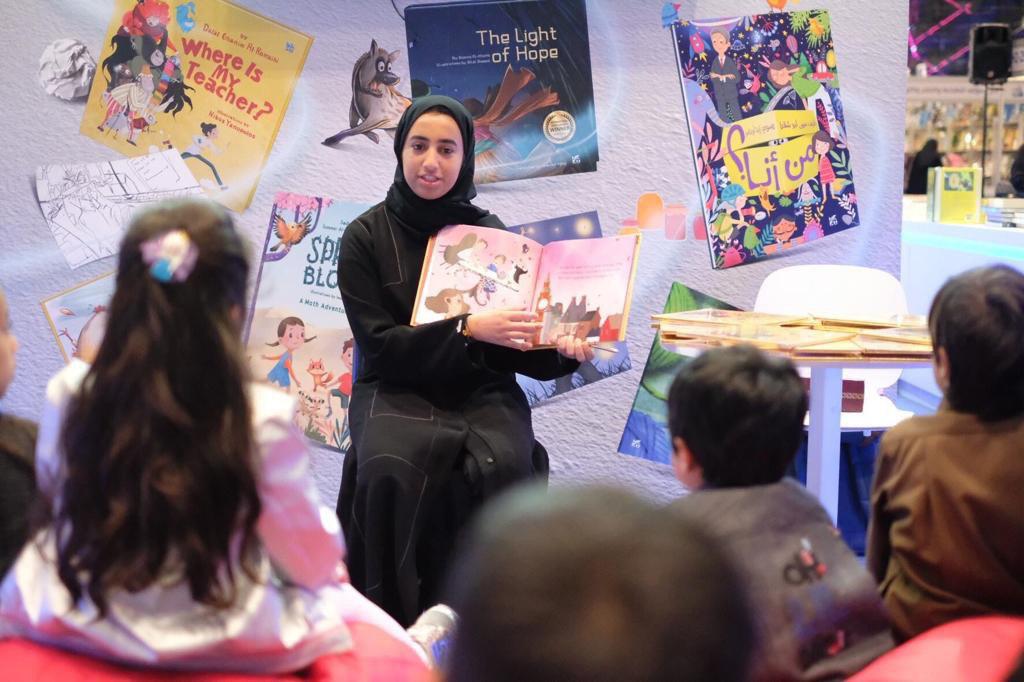
It certainly didn’t take long for her ambitions to be realised. Having published her first book at the age of 14, her goal was to open the minds of her readers and combine several elements from her own life into an enthralling narrative. Taking inspiration from different characters she had come across in books, shows and movies, her motivation stemmed from watching her mother write. With the perfect role model, Dalal finds a way to balance her studies with her writing.
Dalal’s advice to others looking to write while studying? “Write daily, even if it’s just about your day. In the future you will see yourself getting more creative and improving.” She also credits her success to writing down any strong narrative ideas as soon as she gets them. It’s clear for all to see that the Al Romaihi household is one full of strong women with an even stronger voice.
